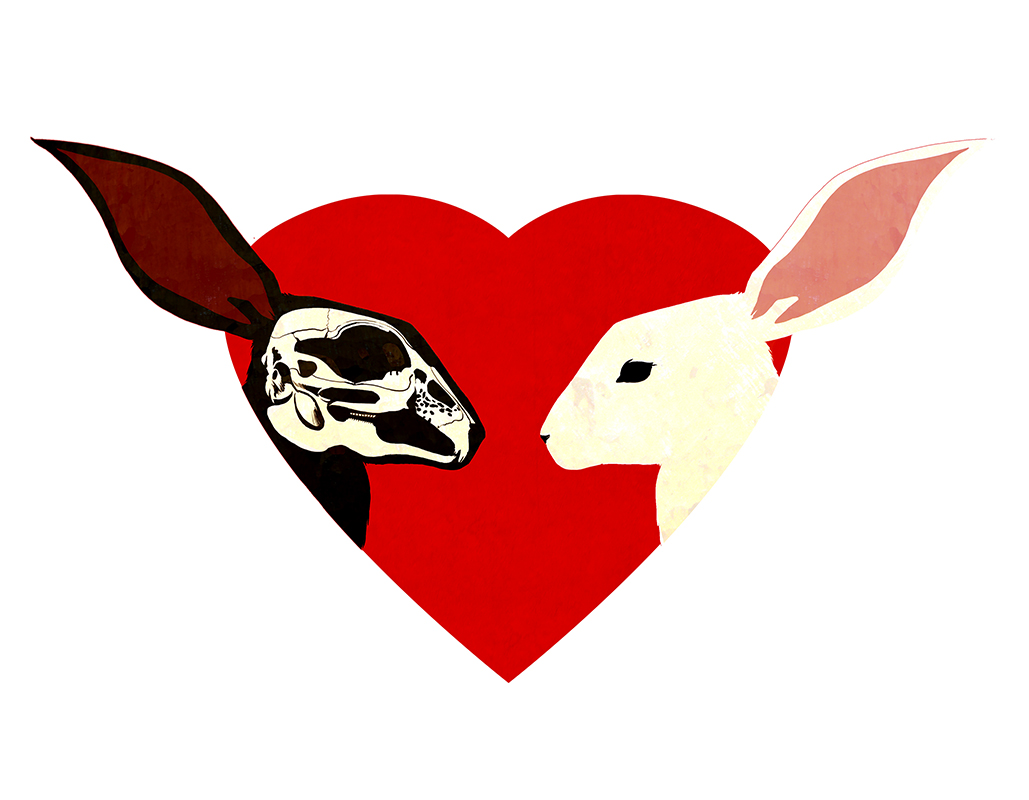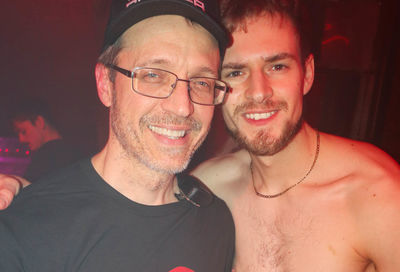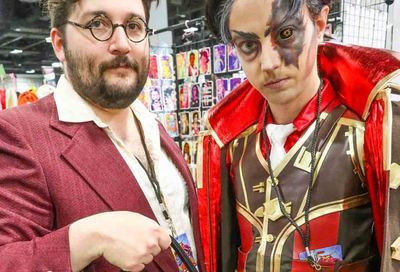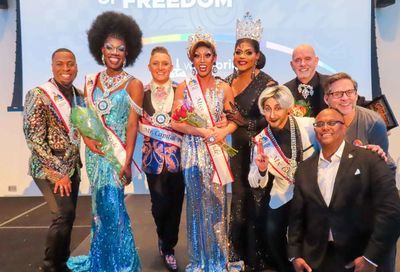At Home with John Waters
The legendary icon on A John Waters Christmas, his book collection, his parents, and why it's going to be so hard to beat Trump

“Don’t look at the Christmas cards! They’re not ready to be seen!” shouts John Waters as we trundle into the basement of his Baltimore home for a cover shoot. There are stacks and stacks of cards on a long, rectangular dining table, all turned upside down, waiting to be stuffed into envelopes, addressed, and mailed to those fortunate enough to be on his holiday list. Waters’ assistant, Jen, briskly moves the cards off the table and a red tablecloth is laid out. Waters takes his place at the head of the table, a rubber Rudolph the Red-Nosed Reindeer head positioned before him. He holds a sharp knife in one hand, serving fork in the other. There is a noticeable glint in his eye.
“I thought you were going to bring a real reindeer head,” he says in mock disappointment. Then he laughs. “PETA’s not going to like this idea.”
During the shoot, Waters makes every possible face imaginable, from genteel to bemused to downright evil. It’s like watching a master class in expressions.
This magazine has interviewed Waters so many times in 25 years, we’ve lost count. The first interview occurred in 1996, in the very same residence we’re in now, where he’s lived since 1990. It’s our first time back in the home, and the first thing one notices are the books, stacks and stacks and stacks of them everywhere, filling shelves, tables, almost any available space.
The variety is astounding, and some of the titles of the art books catch you off guard, like Dian Hanson’s “The Big Penis Book” and “The Big Book of Legs.” There’s fake novelty food, all of which looks alarmingly real, scattered throughout the house — a toppled Starbucks cup complete with spill; a bowl of what appears to be oatmeal with fruit, a spoon sticking out one side; a gorgeous strawberry-topped cake; and lots of sushi. All of it delectable, none of it edible. There’s also movie memorabilia — a prop machine gun from Guys & Dolls given to Waters by Johnny Depp; a demonic Chucky doll from 2004’s Seed of Chucky, which Waters appeared in; and not one, but two “Tinglers” nestled on his living room mantle.
And then there’s an item that we are not permitted to photograph, or, presumably, mention.
It’s a remarkable place, this home. It’s cozy, comfortable, weird and wondrous, filled with character and adventure at every turn. It’s everything you’d expect the home of John Waters to be.
In person, Waters is congenial, friendly, warm, funny. The man responsible for such subversive cinematic classics as Pink Flamingos and Female Trouble — and who also created a singular sensation with Hairspray, which broadened his appeal worldwide — hasn’t directed a movie since 2004’s A Dirty Shame. He doesn’t miss it.
“I’m busier than I’ve ever been in my entire life,” says the 73-year-old, who, when pressed, cites Serial Mom as his favorite film. “I think Kathleen Turner’s great in it, and I think that she elevated everyone else’s acting in the whole movie. She made everybody even better. And I think it looks beautiful. We had $13 million. The only time I ever really had enough money to make a movie.”
He also notes that “Hairspray is the only devious movie I ever made. Because it snuck in mid-America, and it’s still sneaking in. And it’s playing wider than I ever could possibly imagine. Even racists like it. They don’t even get that my ideas have snuck in their family. A fat girl fights for integration. All you need is a good idea, and it was a good one.”
Waters has authored several books — the latest of which Mr. Know-It-All (Farrar, Straus and Giroux, $27) — was released last spring to critical acclaim. He’s currently working on a novel, but the details are under wraps. And he’s now on his annual whirlwind tour of his Christmas Show, which he writes fresh annually, and which will be at The Birchmere next Wednesday, Dec. 18. It’s something he looks forward to every year.
“The first night’s scary,” he admits of the 70-minute monologue, “because I don’t bring notes. People pay good money to see me, I should learn my lines. It’s my anti-Alzheimer’s exercise.”
Long a cultural touchstone for not just the LGBTQ community, but for the world, John Waters is filled with opinions that quickly take their own turn toward dark, laugh-out-loud humor, all the while making a strong, salient, hard-to-refute point. A conversation with him, especially in the comfort of his home, is without a doubt, one of the greatest pleasures on earth.

METRO WEEKLY: To start, I’d like to set the scene. We are sitting in your Baltimore home, in a room filled to the absolute brim with books. Would you call this room a library or a living room?
JOHN WATERS: Living room. But every room in my house is the library, because there’s books in every room.
MW: There are books piled everywhere, even on your infamous electric chair. It is an astonishing amount of books. Almost overwhelming.
WATERS: I have 11,000 in total. But that’s in three homes, one in San Francisco and one in New York.
MW: What does a person do with 11,000 books?
WATERS: You read them.
MW: You’ve read all 11,000?
WATERS: No. There are at least five hundred I haven’t, but plan to. They’re in a section “To Read.” I’m not bragging. I wouldn’t come out and say “I’ve read 10,500 books.” But you asked me, and I guess I have. I’m 73 years old. I’ve been reading and collecting books since I was 14. I like to read. That’s how I relax.
MW: Is there a specific genre you prefer in particular?
WATERS: I like all kinds. I like nonfiction, I like biography, I like show business. But I plead full ignorance on science fiction. That’s one genre I am completely clueless on. I wouldn’t know if it was good or bad. And I do not have a sports section.
MW: How long have you been in this house?
WATERS: Since 1990. I’ve only lived a few places. I talk about it in Mr. Know-It-All. I plan to haunt 315 East 25th Street. That was my first apartment. Then I lived at 3900 Greenmount Avenue, which is where we shot Pink Flamingos. That was the Marbles’ house in that movie. I just heard it’s for sale. I’m sure the people that have it for sale might not even know that we made Pink Flamingos in that house. Then I lived at Temple Gardens Apartment, which is in Druid Hill Park. And then I’ve lived here since 1990.
MW: Do overeager fans find your home?
WATERS: Not really because it’s publicized that I get all of my fan mail and everything at Atomic Books in Baltimore. If you do ever find where I live and write to me, I don’t care how good it is, I will never answer it. But at Atomic Books, I do answer. So I’m selective. Very selective. Also, my neighbors watch out for me, in case there’s any snoopers. Once, they saw them taking my garbage. But I have shredders. You won’t get anything.
MW: This house is both like a library and a museum.
WATERS: And a private mental institution! It has wooded grounds, which always remind me of a private, mental institution.
MW: I was looking around at some of the things that you have —
WATERS: Snooping!
MW: I… I… was snooping.
WATERS: [Laughs.] I’m just kidding.
MW: You have a plate painted with cigarettes.
WATERS: That’s a Damien Hirst. I know people that have whole sets. I only have one plate.
MW: And then the Buildings of Destruction scattered about.
WATERS: I have many, many of them. That’s the Unabomber birdhouse. That’s exactly like a real one, but I don’t put it outside, because birds go in and they don’t get out.
MW: You have a Tingler on the mantelpiece.
WATERS: I have two Tinglers. I have one I bought online and the other one a fan gave me that they crocheted.
MW: I’m also just amazed by the artwork on the walls. There’s a great shot of somebody getting a shave.
WATERS: That’s Rock Hudson. It’s a still from a movie called Seconds.
MW: What art makes it on your walls? How do you choose?
WATERS: It has to be art that at first kind of makes me angry, and then I love it.

MW: So it should provoke a response.
WATERS: That is contemporary art’s job: To infuriate. I like the kind that baits people that hate contemporary art to say, “Oh my God, my kid could do that.” That’s the kind I like.
MW: There’s a painting of a house on that wall. That doesn’t seem infuriating.
WATERS: My parents, when they died, I got that from their house. It’s the family home I grew up in.
MW: What were your parents like?
WATERS: They were very loving, and very normal, upper-middle class, and straight. They were horrified by what I did, but encouraging to me, because they knew I was passionate about it. I’ve written about them a lot. In that book I have, Make Trouble, which was a commencement speech, I talk about how you should deal with your parents. Parents come to me now and ask how to deal with their troubled children. Who would have ever thought that that would happen? But it does. And I don’t give bad advice!
MW: What advice do you give?
WATERS: Be lucky if your kids have an interest, even if you don’t like it. Encourage that interest, because it’ll keep them out of trouble. When they don’t know what they want to be, is when they take drugs and get angry.
Now, if you do know what you want to be, you can take the drugs and be angry too, but usually you handle it better. I was the opposite. When I got success, I stopped taking drugs. Usually that’s when people start taking drugs.
MW: At which point did you stop taking drugs?
WATERS: When Pink Flamingos became successful is when I stopped. I never had a bad experience with drugs, but people I took them with in the beginning are now dead from drugs. So it depends. The new opioid thing is this generation’s AIDS.
MW: The ’70s were so drug-infused that you would think that….
WATERS: The ’60s were more for me. I took LSD in 1964. It wasn’t illegal till ’67. I was ahead of my time. But then when ecstasy came out, no. I wasn’t about to get in a cuddle pile with anybody. Wear pajamas in a cuddle pile with a pacifier? I saw that and it was enough to scare me straight.
MW: When your parents first saw the avant-garde films you were making….
WATERS: Avant-garde wasn’t what they would have called it. And I wouldn’t either. Avant-garde seemed like underground movies with colors jumping around, that kind of thing. Which I hated! I like them now, but I didn’t like them then.
MW: What would you call your movies back then?
WATERS: Underground movies. Definitely. They were just underground movies. I was influenced by Kenneth Anger, and the Kuchar brothers, Andy Warhol, and that whole school of underground. Not Ed Emshwiller and Stan Brakhage, and that whole group who were more poetic than I ever wanted to be.
MW: Did your parents ever see Pink Flamingos?
WATERS: They didn’t ever see Pink Flamingos. They paid for it, and I paid them back with interest. They were the only people I ever got money from who wished I hadn’t paid them back. Because then I wouldn’t ask them again. They were the only backers that prayed it flopped, so it would all be over.
My mother came to see Mondo Trasho, and said, “You’re going to die in a mental institution, O.D., or go crazy.” I said, “Oh, you liked it?” My father saw Female Trouble way later — he had to because the Baltimore Museum gave me this retrospective and he couldn’t get out of it. They came to the premiere of probably everything from Polyester on. They were very relieved at Hairspray. But at A Dirty Shame, they were kind of horrified. My father was 80, and I thought, “God, does he need to know what a plate job is?” Afterward he said, “It was funny. I hope I never see it again.” That was a real blurb to put on the poster. Director’s father.
Today what would shock my father is that I’m on the Nike ad. That would shock him more than anything I ever did in my whole life. Because he was very much a sports enthusiast, and I never was. So that would be the thing that would mostly startle him, that I’m one of the three spokesmen in the new Nike ad. I even get to say, “Just Do It!” Now, the only thing left is I want to say, “This is CNN.”

MW: Did you ever formally come out to your parents?
WATERS: No. They were afraid to ask if I was gay. But they just knew, I’m sure. It was pretty obvious. They were confused because I hung around with girls. And I hung around with straight guys. And I hung around with drag queens. And so they couldn’t quite figure it out.
MW: Did they know Glenn?
WATERS: They knew him as Divine. The first time my mother ever met him was when we were filming Multiple Maniacs on the front lawn. We had the Cavalcade of Diversion set up. And he came in wearing a white, one-piece woman’s bathing suit covered in blood. He was so uptight he took his wig off. Which made it worse. And my mother served us formal tea. She didn’t know what to do. Everybody was a little bit uncomfortable.
MW: Still, they sound as though they were supportive.
WATERS: As much as they wished I made another kind of movie. But they also realized what else could I have done, you know? This was something they’d better encourage because they couldn’t see me fitting in. My father had a company. I worked there one day, and that just didn’t work out. Because of him, not me.
I worked in the warehouse — you know, starting at the top. [Laughs.] I think I put an African American station on the radio, and it was all white people working there. And I was dancing around and I had bleached hair. They weren’t mean to me or anything. My father just didn’t know what to do, basically. That was a traumatic day, actually.
MW: When you look back at Pink Flamingos, based on all your other films, do you think it’s a good movie?
WATERS: It’s not my best movie, but it still works. And people say to me, you made such uncommercial movies. It wasn’t that uncommercial. It’s been playing for 50 years. It played for 10 years in one theater. It was a very commercial movie that cost $10,000. I wanted it to be a commercial movie, because I was trying to think of how to make a new genre, which was exploitation films for art theaters. Which it was. It still is.
It has its moments. It still works, that’s one thing I know. Not many things in the arts hold up in the startling department, and a seventeen-year-old hip kid that sees it today has the same reaction: They can’t believe they saw just what they saw. And that was the best thing about it. Even if you hated the movie, you had to tell someone about it. That’s what made it a hit. It didn’t matter if you liked it or not.
MW: I remember when I first saw it. I was in college and went to a midnight showing in New York. It made my jaw drop. I didn’t know what to think.
WATERS: It was a punk movie, before punk happened, in hindsight. We were angry hippies, and we were making fun of hippies. That’s what Multiple Maniacs was. Divine was thought up to scare hippies. We played [live] at the Palace Theater. We used to come out and Divine would say he followed hippies home and killed them and ate their pets and stuff and they’d all cheer. So it was based on hippily incorrect. The same way I make fun of gay rules in my Christmas show. The same way I make fun of all rules. But I make fun of myself first. And so did Divine.
I make fun of both sides. I mean, I say plenty about politics in the show. How can you not have politics in the show right now, with what’s going on? We’re in a civil war. It’s scary to even go home at Christmas, for fear of relatives — oh, my God, suppose they’re drunk? Which, they could be! What do you do, because they’ll just be hitting over the head with drumsticks, you know? Nobody’s changing anybody’s mind.
That’s why liberals are as big fascists as the Republicans. Because they never think that anybody wouldn’t agree with them. And I’m a bleeding heart liberal. But they never imagine that anybody else wouldn’t agree with them. That’s a problem, too.
And all the TV stations that are on our side are just as bad as Fox. They’re just on the other side. I miss Walter Cronkite. The networks are the best, to me, because they at least pretend they don’t have an opinion.
MW: Do you have any thoughts on how this is all going to end?
WATERS: As a journalist, my fantasy is that Trump lost by one vote and he refuses to leave the White House. And we have to have tanks come in to get our own president out of the White House. As an anarchist, that’s the drama I’d hope for. I’m just saying….
MW: There’s a movie in there.
WATERS: As a scenario, it’s a good movie plot. The day the tanks came in. “Don’t touch the hair! Don’t touch the hair!”
MW: Does it bother you that America’s going through all this?
WATERS: It’s exhausting! But I lived through Nixon. I lived through Ronald Reagan, who was really horrible. I lived through a lot of them. I don’t think Trump hates gay people. I think he’s an asshole. I think he has to say he hates them now, but he used to be at Studio 54. He was a liberal. He’ll say what he has to say. But the trans thing? I mean, that’s easy for him to be against because so many people are so stupid about that, you know? They go so crazy about that. They act like Big Freedia’s going to come in and piss on their kid in school in the bathroom. I hope she does.
MW: Do you think America’s going to come out of all this Trump madness for the better or worse?
WATERS: Who knows? If he gets four more years, it is truly a scary thought.
MW: Who would you like to see beat him in the election?
WATERS: I don’t like any of them. I think they’re all terrible and they’re all going to lose. What fun is it to [be for] Elizabeth Warren? It was fun to be for Obama. But Trump, he’s having fun being an asshole. And so are his supporters. They are having fun. We aren’t.
MW: Will you vote for any of them?
WATERS: Yes, I’ll vote for any of them. But that’s not how you win.

MW: We could possibly have the first gay president in Pete Buttigieg.
WATERS: What African American is going to vote for him? I’m sorry, I love the idea of a first gay president, sure. I mean, I’m not against him. But he didn’t know who Alfred E. Neuman was. I hold that against him. If you don’t know who Alfred E. Neuman is, I have a hard time being for you.
Somebody needs to come from out of the blue. Bill Maher said this and Michael Moore said it, and they’re both right. Like Oprah or Michelle Obama. Somebody that you’d be the most shocked to get. And they’d win. But [the current candidates are] going to lose. So we better think of something quick.
MW: You don’t think Biden can beat Trump?
WATERS: Who’s going to be wildly excited for him? What we had to do is to get a Trump supporter to change their mind. Well, who of the ones are ever going to do that? Maybe Biden. You think they’re going to change their mind for Elizabeth Warren? If they didn’t vote for Hillary….
Everybody I know will vote for any of them. What we have to get is the Trump supporters to change their minds. But I don’t see that, except maybe Bloomberg or Biden. And I don’t care if they’re white men. I want to win! Then we’ll decide if we can have plastic straws or not. I’m too butch for plastic straws. I’m too butch for straws of any kind.
MW: You don’t think the impeachment’s going to make a difference?
WATERS: I don’t know. It seems like nothing else sticks. It seems like Nixon did way less, and it worked. But I don’t know. It seems like nothing matters, really.
MW: John Waters for President. That’s out of the blue.
WATERS: That’s in my last show.
MW: Would you run for president?
WATERS: No. I have enough power as it is.
MW: What exactly is that power?
WATERS: I would just say I have extreme power that surprises me. I just came from Australia where I did four cities of my show. I went to Tasmania. I walked in and there was a grown man dressed as Edith the Egg Lady. I thought, “That’s as far away as you can get from Baltimore. How did that ever happen?” That’s power.
MW: Do you still enjoy doing the Christmas show?
WATERS: Yeah, I do, because every year it forces me to write all-new material. I memorize a 70-minute speech with no notes from the first night. [The show] keeps my office running for the whole year — if you want to be honest — financially. And I stay in touch with my fans. I see them in every city. We have a signing. Elton John said the day you stop touring, it’s over. So I’m in touch. I see all the people that have let me get away with this for so many years, really. And thank them really.
MW: How do you feel about your fans?
WATERS: They’re great! Are you kidding me? They’re smart. They get their roots done before they come to see me. They dress well. They read. They’re informed. And if they don’t get a joke, they look it up. I have the best fans.
MW: What do the holidays mean to you?
WATERS: The holidays, to me, are a little bit melancholy, because my parents are both dead now. So that changes things. But my sisters are alive — my brother died of a brain tumor, way too young. It’s our turn to have the Christmas dinner. So I have 14 people here. The day after we have the real Christmas. This year it’s at my niece’s house. I have to buy a million presents. Just like everybody.
MW: Do you think the holidays can be a healing moment for the country?
WATERS: I think a lot of people must hate them. Why do we think that people have to talk about Jesus? For Arabs, and Buddhists, and Jews — I’d be pissed about Christmas. All the time having to listen to it and everything? And who’s Santa to be judging everybody? Spying on children? He’d be arrested!
MW: You talk about your parents being dead. You’re going to be 74….
WATERS: The last chapter of [Mr. Know-It-All] is how I beat death. You have to buy the book for that!
MW: But don’t you think about your own mortality?
WATERS: Sure. How do you not at 73? I’m not going to live to 146. I’m not middle-aged.
MW: Well, you could live to 100.
WATERS: I believe in science, but not that much.
MW: Does death scare you?
WATERS: Sure. It scares me only because you can’t control it. You don’t get to pick how you die. But I think I’ve had a great life. If I drop dead tomorrow, the only thing I regret is smoking cigarettes. But I haven’t had one in — oh, it’s upstairs, but I write it down every day — six thousand, three hundred and some days. That’s the only thing I regret, smoking. And if I’d kept doing it? I’d be dead.
It’s the only thing the government has ever told you, in this country, that’s true. [Cigarettes] kill you. And my friends are dying from it now.
MW: Do you think cigarettes should be illegal?
WATERS: Well, that’s a tough one. Because some people don’t die from cancer if they smoke. Most do. Should it be illegal? Maybe not. That’s not my business. It’s other people. Then why wouldn’t liquor be illegal? I can have one drink, and I look forward to it. Other friends I know, if they have one drink, they’re in prison.
MW: What do you think about all the gun violence?
WATERS: I’m a proud GAG member — Gays Against Guns. I’ve even marched with them. I don’t have the right to own any gun, even for hunting, and I say this in the show. Go give the animals in the woods a gun and teach them to shoot back. Then we’ll call it a sport. I’m not against eating meat, but I wouldn’t get enjoyment out of killing it.
MW: Do you try not to think about where food comes from then?
WATERS: All food is disgusting, because it ends up in shit. I think shitting is disgusting. I don’t want to have to do anything. But you do have to shit. That’s what I said on Bill Maher, “The only good thing about being dead is that you never have to do that again.” And he looked at me in horror when I said that, because I hadn’t mentioned that in the pre-interview.
Never in my lifetime will humans not eat meat. It is barbaric. However, I like meat. And eat steak tartare, so I’m not going to be a hypocrite about it. I don’t want to go kill it. I don’t want to sneak up on beef and shoot it, and then get some excitement out of that.
I’m also violently against emotional support animals on airplanes. If you’re that fucked up, go to a mental institution. Don’t bring a llama on board and have to sit next to me.
MW: You bring up mental institutions a lot. It seems to be a recurring theme with you.
WATERS: All of my fans fear one day a straight jacket. Maybe even me, too. But it’s a good look, a straight jacket. Cecil B. Demented wore one as fashion, so….
MW: One final question for your fans. What’s your holiday greeting this year for them?
WATERS: This year, we need more extreme political defiance. And so, I like abstract Christmas this year. Come up with a really good protest against Trump that’ll get us votes, and make us all laugh at the terrible situation we’re in. Ho-ho-hostile!
A John Waters Christmas is Wednesday, Dec. 18, at 7:30 p.m. at The Birchmere, 3701 Mount Vernon Ave., in Alexandria, Va. Tickets are $55. Call 703-549-7500 or visit www.thebirchmere.com.
[crowdsignal poll=10473661]
Support Metro Weekly’s Journalism
These are challenging times for news organizations. And yet it’s crucial we stay active and provide vital resources and information to both our local readers and the world. So won’t you please take a moment and consider supporting Metro Weekly with a membership? For as little as $5 a month, you can help ensure Metro Weekly magazine and MetroWeekly.com remain free, viable resources as we provide the best, most diverse, culturally-resonant LGBTQ coverage in both the D.C. region and around the world. Memberships come with exclusive perks and discounts, your own personal digital delivery of each week’s magazine (and an archive), access to our Member's Lounge when it launches this fall, and exclusive members-only items like Metro Weekly Membership Mugs and Tote Bags! Check out all our membership levels here and please join us today!

























You must be logged in to post a comment.